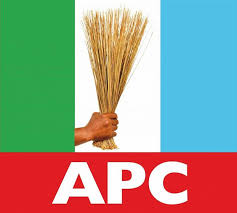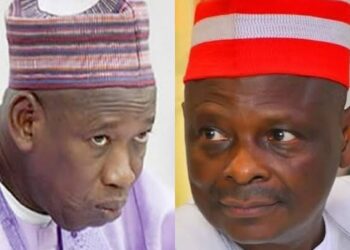By Hassan Gimba
To the casual politician, assuming we accept that all men (and women) are ‘political animals’ and some are more political than others, 2019 is still quite a way off. Hassan Gimba writes on the situation in Yobe state.
How far is 2019?
To the more political ‘political animal’, however, 2019 is now, because the knots tied or untied today will, by and large, determine who gets what or who loses what come that fateful year.
The observant person knows that nationally a lot of alignment and realignment is taking place, sometimes subtly, in other instances not so subtly. Old debts and IOUs are being called up and yesterday’s enemies are becoming chummy wiTheach other, heralding the imminence of today’s friends becoming estranged tomorrow.
Strange bedfellows
Most (if not all) of our political parties are associations of strange bedfellows who assembled and cobbled themselves together into power-grabbing clubs. This is why a doyen in party A can switch loyalty to party B and feel at home, and tag such action with the euphemism ‘cross carpeting’. Our political parties are not ideology driven.
Prior to the election of President Muhammadu Buhari, political fortune was determined by the depth of the pockets of contestants and parties and not necessarily by a candidate’s character and competence.
The Nigerian people have always complained about bad leadership, megalomaniac rulers and thieving custodians of the treasury. But election after election, like cursed occupants of hell, they line up to vote in the ‘rodents’ they cry about, for a price sometimes as small as a stock cube.
Politics redefined
For the first time in Nigeria’s history, tired of betrayal, the traduced revolted against their traducers and elected a man they believed to be, like Caesar’s wife, above board, thereby, assumedly, setting a bar by which future potential leaders would be measured. Whether the country has come of age and will sustain that is another thing 2019 will reveal.
Yobe and nascent democracy
Yobe State, politically a toddler, is still at the stage where largely, factors other than merit determine who becomes Governor. To date no Governor in the state was elected solely on merit. However, one or two, including the incumbent, did go on to prove that ba’a yi zaben tumun dare ba by serving the state commendably.
But one cannot talk about Yobe and its possible governors without knowing the political history of the area.
The geographical entity, even while it was still a part of the larger Borno enclave before being carved out and called Yobe, has always been left of the centre. It has never been part of the ruling party, except now and during the short-lived NPN (National Party of Nigeria) government of Asheik Jarma in 1983.
However, in 1999, but for political wrangling as a result of unfair party primaries, the Peoples Democratic Party (PDP) would have possibly won the Governor’s seat, having won 10 of the state’s 17 Local Government Chairman seats, leaving the then All Peoples Party (APP), which eventually produced the Governor, with seven.
While there may be many mundane or parochial reasons that determine who governs the state, the incumbent generally has huge influence over who emerges as his successor. In 2007, the then outgoing Governor, Bukar Abba Ibrahim, had, of course, wanted the late Usman Albishir, a long time ally, to take over from him instead of the late Mamman Ali, who eventually occupied the Government House.
Governor Bukar influenced the emergence of Albishir as flag bearer in a closely guided primary election when, unlike other aspirants at the time, Mamman refused to step down. But the late Governor, wily, intelligent and calculating, ran rings around the duo of Bukar and Albishir to emerge as candidate and subsequently, Governor.
Bukar would have covertly caused the defeat of Mamman Ali, who took as his deputy the current Governor, Alhaji Ibrahim Gaidam. Gaidam was also a victim of Bukar’s orchestrated primary election when he contested for the Senatorial seat, of which Bukar is now the current and third-time occupant.
But for another not so subtle intervention by the then Economic and Financial Crimes Commission (EFCC) chairman and Mamman Ali’s friend, Nuhu Ribadu, in 2007, the Governor’s seat could have gone to either Adamu Maina Waziri of the PDP or Tijjani Musa Tumsah of the then Action Congress (AC), depending on where Bukar may have pitched his tent.
The week before the election, when there were some telltale signs that Bukar might ditch his party’s candidate, the EFCC swooped down on the state and detained top-ranking government officials, including the then Secretary to the Government, Alhaji Baba Ba’aba.
In a panic, Bukar ran to Abuja and went to Ribadu. Well, his officials were released to him and he came back to Damaturu, the Yobe State capital, the Wednesday before the election and called on “all the good people of Yobe and party faithful” to elect the candidate of their party, the then All Nigeria Peoples Party (ANPP).
Ongoing political undercurrents
As earlier pointed out, there is a groundswell of political undercurrents going on. The challenge before the APC is not being there, but keeping their flag at the villa, considering that a strong party that held sway there for sixteen years was toppled off its perch by it. For the APC, being number one may not be as challenging as remaining number one.
Many foresee an implosion at the national level and the party at the state level may not fare any better considering that some of its bigwigs are feeling marginalised, as there is a possibility of one or two ‘outsiders’ getting the Governor’s blessing.
The PDP, which, it would seem, has been waiting in the wings in Yobe for an eternity, may cash in on any miscalculation the APC may make, while at the national level it may experience a lift, if it can get its act together. The odds are that the trophy could go either way, depending on how certain permutations play out.
Therefore, in this three-part analysis, we will be looking at the strengths of the two main parties, the All Progressives Congress (APC) and the PDP, and the various names making the rounds, their selling points and handicaps, and their probability of collecting the baton from Alhaji Ibrahim Gaidam in 2019.



